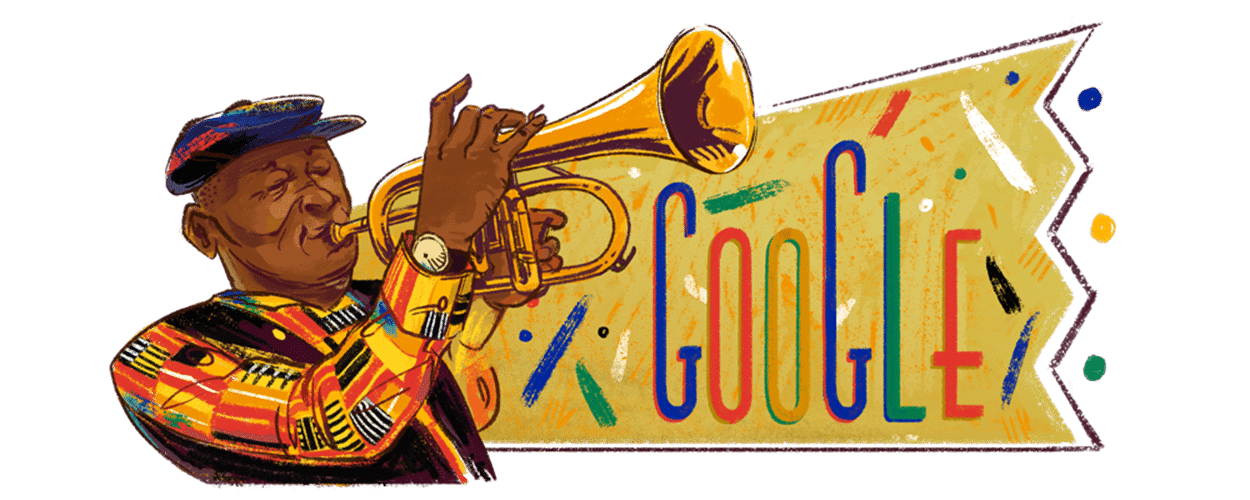Remembering Hugh Masekela: A Tribute to the Jazz Maestro and Activist

Image Courtesy: Google Doodle
Hugh Masekela (4 April 1939 – 23 January 2018) was a South African trumpeter, flugelhornist, cornetist, singer and composer who was described as “the father of South African jazz”.
Life and Career
Hugh Ramapolo Masekela was born in the township of KwaGuqa in Witbank on 4 April 1939. His parents were Thomas Selena Masekela, who worked as a health inspector and sculptor, and his wife, Pauline Bowers Masekela, who was a social worker. He had a younger sister named Barbara Masekela, who later became a poet, teacher, and supporter of the African National Congress (ANC).
When Hugh was a child, he loved singing and playing the piano. He was mostly raised by his grandmother, who ran a bar for miners, even though it was against the law. At the age of 14, after watching a movie called “Young Man with a Horn,” where Kirk Douglas played a character who was a famous jazz musician, Hugh became interested in playing the trumpet. His first trumpet was a gift from Archbishop Trevor Huddleston, who was against apartheid, the system of racial segregation in South Africa.
Hugh quickly learned how to play the trumpet with the help of a teacher named Uncle Sauda. Some of his friends from school also became interested in playing musical instruments, so they formed a band called the Huddleston Jazz Band, which was the first youth orchestra in South Africa.
His father was a pianist and his grandfather was a traditional healer who played the horn. Masekela began playing the trumpet at an early age and showed exceptional talent, earning a scholarship to attend the Manhattan School of Music in New York City. While in the United States, he became involved in the civil rights movement and was a close friend and collaborator of many prominent African-American musicians, including Harry Belafonte, Miriam Makeba, and Miles Davis.
Masekela’s music was a fusion of African rhythms, jazz, and traditional South African musical styles, such as mbaqanga and township jive. His most famous song, “Grazing in the Grass,” was a worldwide hit in 1968 and showcased his unique blend of African and Western musical influences.
Throughout his career, Masekela was a vocal opponent of apartheid in South Africa and used his music as a tool for political activism and social justice. He was forced into exile from his home country for many years because of his activism and only returned to South Africa after the fall of apartheid in the 1990s.
In addition to his music career, Masekela was also an author, actor, and educator. He wrote an autobiography, “Still Grazing: The Musical Journey of Hugh Masekela,” and appeared in several films, including “Amandla! A Revolution in Four-Part Harmony.” He also founded the Hugh Masekela Heritage Foundation, which supports music education and cultural preservation in South Africa.
Hugh Masekela passed away on 23 January 2018, at the age of 78, leaving behind a legacy as one of the greatest African musicians of all time and a tireless advocate for social justice and human rights.
Award and Legacy
Hugh Masekela’s contributions to African music and his activism for social justice have been widely recognized with numerous awards and honours throughout his life and posthumously. Some of his notable awards and recognitions include:
- Doctor of Music Honoris Causa (University of KwaZulu-Natal, South Africa, 2017)
Masekela was nominated for a Grammy Award three times, including a nomination for Best World Music Album for his 2012 album Jabulani, and one for Best Musical Cast Show Album for Sarafina! The Music Of Liberation (1989) and one for Best Contemporary Pop Performance for the song “Grazing in the Grass” (1968).
Masekela’s legacy in African music and culture is also significant. He is widely regarded as one of the pioneers of African jazz and his music has influenced many generations of musicians both in South Africa and around the world. Masekela’s activism and use of music as a tool for social justice have also had a lasting impact on the struggle against apartheid in South Africa and on the global movement for human rights. He is remembered as a cultural icon, a musical genius, and a fearless voice for justice and equality.
On 4 April 2019, Google celebrated Hugh Masekela’s 80th Birthday with a doodle.
Observer Voice is the one stop site for National, International news, Sports, Editor’s Choice, Art/culture contents, Quotes and much more. We also cover historical contents. Historical contents includes World History, Indian History, and what happened today. The website also covers Entertainment across the India and World.

